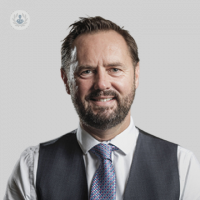Knee arthroscopy: Procedure, risks and recovery
Written in association with:A knee arthroscopy is a surgical procedure that can help to identify and treat a range of knee joint problems.
Here to provide an expert insight into a knee arthroscopy is renowned consultant orthopaedic knee surgeon, Mr Alexander Anderson. The Sheffield-based specialist discusses the procedure, the risks involved and the recovery time, among other important points.

Why might I need a knee arthroscopy?
A knee arthroscopy is a minimally invasive surgical procedure that can diagnose and treat a range of problems in the knee joint, including:
- A torn anterior or posterior cruciate ligament
- A torn meniscus (which is the cartilage between the bones in the knee)
- A patella that is out of position
- Floating fragments of torn cartilage or bone that are loose in the joint
- A Baker’s cyst
- Fractures in the knee bones
- Swollen synovium (which is the lining in the joint)
- Damaged cartilage
- A build-up of fluid that must be drained
You may be recommended a knee arthroscopy if you are experiencing persistent knee pain and/or stiffness.
How is a knee arthroscopy performed? Is ligament reconstruction always involved?
During a knee arthroscopy, your orthopaedic surgeon will start by making a very small incision in the knee. A microscopic camera, called an arthroscope, will then be inserted into the knee, allowing your surgeon to view the inside of the joint on a digital screen. Your surgeon will then examine the issue affecting the knee joint and, if necessary, treat and correct the problem using small surgical instruments within the arthroscope.
Some of the common arthroscopic procedures that can be performed for the knee include:
- Partial meniscectomy (which is the removal of the meniscus)
- Repair of a torn meniscus
- Meniscus transplantation
- Reconstruction of a torn anterior or posterior cruciate ligament
What are the risks and complications associated with a knee arthroscopy?
Like with any surgery, the risks of a knee arthroscopy include bleeding and infection. Some patients may develop blood clots, knee stiffness, or swelling due to blood pooling in the knee, but this is relatively uncommon.
Complications from a knee arthroscopy are rare.
How long does it take to recover from a knee arthroscopy?
After a knee arthroscopy, it is important to follow your surgeon’s instructions to ensure a successful recovery. This may include rest, elevation, and icing of the knee to reduce swelling and pain. Patients may also be prescribed pain medication and be recommended physiotherapy to help restore strength and mobility to their knee.
The recovery time after a knee arthroscopy can vary, depending on several factors such as the type and the extent of the surgery, the patient’s health, and the specific rehabilitation program. A complete recovery can take between six weeks to 12 months, because the knee joint requires time to reproduce joint fluid after surgery.
Will I require physiotherapy before or after the procedure?
It is important to begin exercising the knee immediately after undergoing knee arthroscopy to restore strength and the full range of motion. Initial exercises should be non-weight-bearing, focusing instead on the gentle strengthening of the muscles surrounding the knee, as well as increasing joint range of motion.
Your surgeon may recommend approximately 20 to 30 minutes of exercise two or three times a day.
Mr Alexander Anderson is a highly skilled consultant with over 15 years of experience.
If you require a knee arthroscopy and you would like to consult your options with an expert, do not hesitate to book an appointment with Mr Anderson via his Top Doctors profile today to receive expert treatment and assessment.


